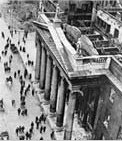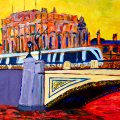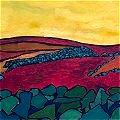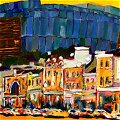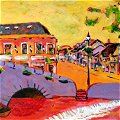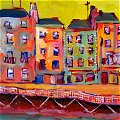Review: ‘To Hell Or Barbados’ by Damien Dempsey
The following review of To Hell Or Barbados by Damien Dempsey, appears in a slightly shorter version in the July 2007 issue of the Midwest Irish Focus.
It’s a companion piece to the audio interview with Damien Dempsey I did a couple of weeks back.
Heathrow Airport, London. Damien Dempsey has a chance meeting with Shane MacGowan.
“I was sitting there in a pair of basketball shorts – it was warm out – he was sitting there in a bleedin’ sort of Brendan Behan get up and a top hat. He was just looking at me saying, Man, you don’t look like a rock star, you want to get an electric guitar and a leather jacket so you don’t get lumped in with all the bland brigade, all these singer-songwriters of the moment, all these sensitive types. Get some balls, that was the vibe I was getting off him, get some attitude or something. So I took his advice, I think it was good advice.”
Listowel, County Kerry. A wedding. Two Dublin men talk. The father of the bride asks a friend of the groom,
-Do you like Damien Dempsey?
And the younger man responds,
-Ah ya’d have ta, ya know?
It’s a simple answer but the sentiment sums up the compulsive quality that Damien Dempsey brings to his music. Damo is real, and Damo is one of us.
Like no artist in Ireland of any musical genre, those I know of who have come to Dempsey’s music, be they friends or famous, have been mesmerized since first contact, their first Damo album being like a first love.
And so it is with a new Damien Dempsey album that you experience all the worry and excitement of meeting a lover after a separation. Will the magic still be there, or are we just left with what we already shared?
To Hell or Barbados is Dempsey’s new album, and lovers of Damo need have no fears. It is a gorgeous mosaic of raw emotion that will win many new fans to this very special talent.
An urban folk hero, Dempsey is like an Irish Howard Zinn singing A People’s History of Ireland and the Irish, its drunks and drug-addicts, warriors and lovers, abused and tyrants.
His concerts in Ireland are unique in how they have elevated what we all grew up with as parties with sing songs into mass celebrations of song with a fervour normally reserved for sporting events.
Talking with Damien Dempsey on the occasion of this latest release, To Hell or Barbados, I asked him if he has any feelings or understanding as to why what we have come to call the Damo Phenomenon, this intensity experienced by his fans, exists.
“I suppose some like the lyrics. I’m never going to let your negative vibes and comments, stuff like that. The kids just get a great buzz out of people coming out and saying things like that, because I suppose nobody else has really – in the music scene here in Ireland, that gives out them positive lyrics like love yourself today. I’ve tailor made a lot of them songs to have hooks in them that people can sing along to. I’ve written them specially.”
One listen to Barbados and you can hear the songs being sung by thousands. Love songs, happy songs, warrior songs, and laments. Regardless of style, Damien is writing traditional Irish songs.
To Hell or Barbados is a more understated album than previous releases. The lyrics are as strong as ever, but it doesn’t come across as angry in a very vocal way. The lyrics say what they say, but quieter. The title track for example, To Hell or Barbados is like an appendix to Colony in a way, but it has a quiet fire in its telling of the story of 50,000 Irish men, women and children sent to Barbados as slaves during Cromwell’s conquest of Ireland.
“There’s a few I suppose little influences in the history of Ireland that I was never taught about in the history books, like the Choctaw Nation, and these guys who were sent to Barbados. I was a bit angry, I felt these things should have been included in Irish history books so that’s why I stuck them down.”
To Hell or Barbados is a beautiful song, sung by Damien as a lament and building up into an Irish music celebration, a song I can hear Christy Moore singing, the idea of which doesn’t disappoint Dempsey.
“I’d love to hear him singing it. I’d love to hear him singing it, I would”
When pressed for other names he might like to hear sing his songs, Damien comes up with some mouth-watering thoughts.
“I wouldn’t mind hearing Pavarotti doing one of them, for the crack. Sinead O’Connor has covered a song called It’s All Good, which is great. I’d love to hear Christy doing a song of mine, some day, if I could try and write a song for him, I’d love to hear that. I wouldn’t mind hearing Morrissey do one either.”
And how do Americans react to an Irish man singing about the Choctaw nation?
“Oh very good. It’s gone down well anywhere I’ve played it. In Chicago it went down very well. And on the tour last year in America it seemed to go down – all the people were asking for it, all the Americans were asking for it. They thought it was a great thing for someone to write a song about that. And I thanked them and apologized for some of the Irish-Americans who, and some of the Irish around the world who I apologize for, who were tyrants. The Irish-Americans seemed to love the historical nature of some of the songs that I sing. The Colony and Choctaw Nation seemed to go down best with the Irish-Americans.”
The most dramatic moment on To Hell or Barbados is when you go from Your Pretty Smile, this wonderful, unabashed love song, a reggae thing so joyous you’ve got a smile on your own face listening to it, and then you go straight into the menacing guitar of Serious, and this horribly serious Dublin drug-pushing conversation.
Possibly a man born long after his time, you feel sorry Dempsey didn’t get to live in Dublin’s 1950s, and drink with Patrick Kavanagh and Brendan Behan. The order of songs on Barbados is no accident and harks back to a vinyl age when people listened to albums in the order they were set down.
“I put a lot, an awful lot, a month trying different line-ups of the songs. I wanted to have an antidote to something that happy, that poppy, like Pretty Smile. I wanted to have an antidote straight after it, so the more hardcore crowd wouldn’t think that I was selling out, ha ha. They’d probably think, ah, Damo is going soft, did ya hear that Pretty Smile? And then Serious would come in and they go, Whoa, he’s not. Ha, ha.”
One of the stand-out pieces on the album, Serious, although a conversation, is no mere gimmick. The dialogue itself in all its horrors is a rhythmic rolling dance of manipulation and macho fears, and split into sections by a simply sung chorus of pure vulnerability.
No sooner is that over and Damo takes us back into a happy reggae one again with Teachers and we’re kind of reeling. Teachers is a salute to teachers on the stereo, like Woody Guthrie, Bob Marley, and Johnny Cash along with Dublin heroes like Luke Kelly and Phil Lynott. And happy as it may sound it also sounds the alarm for their lessening numbers.
Is it possible that Damien has yet to realize that he is now such a teacher himself on the stereo? The most celebrated graduate of Dublin’s Rock School, Damo stays in touch with the course he finished over a decade ago.
“I still meet kids who are going out there. I helped to get a young fella in there now, so I met him to go to a sing-songwriter’s night, and there was loads of kids at it who were going there now. They were singing all these songs, they were very good they were, but I could hear my influence coming through on them now.
They were singing songs of what’s going on around Ireland now, and they were all keeping their own accents when they were singing. It was nice to hear.”
Outside his fanbase Damien is known more for his anger but Dempsey’s songs run through all the emotions. Kilburn Stroll is a beautiful song of love. And trust.
Kilburn and the Irish part of London is where Dempsey wrote much of this album over the last two years. Culturally it’s a unique place from an Irish perspective. All of Ireland in one little spot. 32 accents that you don’t even hear in Ireland anywhere. I asked Damien what it’s like now, if it’s full of the ghost of Shane MacGowan and Irish people that have left?
“There’s a lot of old boys there now who are bollixed, who have sent money back here, and stabilized the country to create the Celtic Tiger and now they’re just abandoned over there. I’m doing a gig for them in a couple of weeks on the Kilburn High Road. They’re inviting all the very wealthy Irish people in London to come down – it’s 300 pound a ticket and they’re going to make donations. It’s for a homeless center in Cricklewood. So I’m trying to highlight that to some of the people here.”
The loudest song on the album is Maasai the opening track, and possibly the least accessible. That said with its big guitars and Damien’s holding of big long notes it’s a song I’d love to hear outdoors and loud. Damien agrees.
“It’s a lot better song live than it is on an album. It goes down great live. People seem to go mad for it live, and when the band kicks in and all.”
The album finishes with a love song to modern multi-cultural Dublin called The City. It’s an intoxicating mix of beats and rhythms, spoken words, and atmospheric singing.
Still I love the bones of her
Still I am transfixed by her
I am her offspring, and I am part of her history
I am her family
I asked Damien why he chose electronica to express his love for his city.
“I suppose it just relates to the time I grew up in. There was a big mad House scene and ecstasy and all that came onto the scene and that was the music that a lot of the kids were listening to. All this rave music was wafting out from houses and out of cars. I just wanted to document that, That was a lot of the kind of music that I was hearing going around Dublin in the 90s so I wanted to experiment with that and just stick it in there so it wouldn’t be just another acoustic driven song with drums around it like a lot of my last albums.”
Damo is playing Ireland’s big music festival this summer, the Electric Picnic, but will it be a Damo gig – will there be as much singing as there might be at smaller venue?
“I’d say there definitely will be, yeah. I’ve a feeling. There’ll be a load of people there, a good few thousand. Like there was 10,000 at Oxegen, and they stood in the worst July day I’ve ever seen. It was f***in’ freezing, and pissing, the hardest rain, and a freezing cold wind, and 10,000 people stood there and watched and watched and sang along. I couldn’t believe they all just didn’t go into the tent and the big huge dance hall. They could’ve but they f***in’ stood there and got pissed on just singing along. So we’re in a tent at the Electric Picnic. We’re the last act on the Sunday, the Sunday night finishing it off. I think it’s going to be a rocker. I have a feeling.”
In the Irish charts To Hell or Barbados was released a month earlier than in the US and went straight in at number 2, being pipped by Live in Dublin by Bruce Springsteen, another influence on Damo.
“A lot of his songs, just the lyrical content, it’s like a motion picture. A lot of his songs really paint a picture of New Jersey, New York life. I love that. His early stuff like Darkness on the Edge of Town and them albums, Born To Run and that. I love them.
And he would have influenced songs like Factories, Trains and Houses, the way he was writing. And I think he influenced Philo as well. And some of Philo’s stuff is like that, and that would have influenced my songs, like Factories, and Spraypaint Backalley.”
The hope and respect in the songs that are How Strange and Chase The Light round out a wonderful collection of songs this time around. Listen to To Hell Or Barbados and summer will be in your heart, with the uilleann pipes and Damo’s singing, the vocal equivalent of the pipes, mainlining into your veins.
9/10
Damien Dempsey is coming over to the Midwest in August, 2007. “A tour of somewhere around there. Milwaukee and places like that”. You can see him perform at Irish Fest on Sunday August 19.
To Hell or Barbados is released on July 3 on UFO Music, United for Opportunity.
Listen to the audio interview I did with Damo from which the quotes in this review are taken.

 Eolaí gan Fhéile:
Eolaí gan Fhéile: